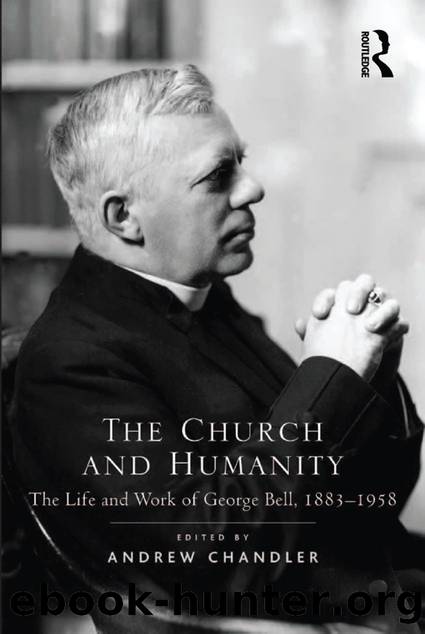The Church and Humanity by Chandler Andrew;

Author:Chandler, Andrew;
Language: eng
Format: epub
Publisher: Taylor & Francis Group
Published: 2016-08-15T00:00:00+00:00
The âProblem of Germanyâ
During wartime, Bellâs advocacy for the âotherâ Germany was also expressed in the support he gave the anti-Nazi resistance. This support was manifested in a number of ways. In practical terms, Bell acted as an intermediary for the resistance, by using his influential position to pass papers from the resistance to the British government. Within these German documents were proposals for how the war in Europe could be brought to an end. Bell did not merely deliver them but acted as an advocate for the other Germany.
As advocate, Bell made two main arguments: The first was that Germany could not be equated with Nazism and, accordingly, that the British government should publicly recognise the âotherâ Germany. His second major argument was to press for an official declaration that if the other Germany could overthrow the Nazi regime, then Britain would support the ending of the war through an agreed peace settlement. In contrast, he perceived that the stance of the British government was that there was no âotherâ Germany. This was a position popularised during wartime by Sir Robert Vansittart who, in radio broadcasts and in print, argued that the Nazis were merely the latest manifestation of a German national character which went back to Tacitus.23 The policy accompanying this assumption was one of âunconditional surrenderâ â meaning that the Allies would fight Germany until it gave itself up to the mercy of the victors or was destroyed. Furthermore, the British government made no official declaration of what it intended to do with Germany following its unconditional surrender, thus leaving what was often known as âthe German questionâ without an official answer. However, among the answers to the German question emerging from high places were those which, in effect, called for its destruction as a modern unitary state, by de-industrialisation to remove its capacity to wage war and by the break-up of the country into a number of smaller states. The plan put forward by US Secretary of the Treasury Henry Morgenthau in 1944 â which was initially accepted by Roosevelt and Churchill â was the most prominent example of this way of thinking.
However, even if the German question was not to be answered by de-industrialising and breaking up the country, an alternative and credible answer was still required. Even if Germany was defeated, it would remain the most populous nation of Europe and would again become the industrial and economic giant of the continent. Although this Germany was economically essential to Europe, it was such a Germany which had waged a series of increasingly destructive continental wars since 1870. For these reasons, the âGerman questionâ was a genuine problem confronting those planning for reconstruction after the end of the war. For example, in March 1941, a private meeting of the Committee on Reconstruction of the Royal Institute of International Affairs was called to discuss the âproblem of Germanyâ.24 The speaker at this meeting â at which Bell was present â was Geoffrey Crowther. Crowther did not
Download
This site does not store any files on its server. We only index and link to content provided by other sites. Please contact the content providers to delete copyright contents if any and email us, we'll remove relevant links or contents immediately.
| Africa | Americas |
| Arctic & Antarctica | Asia |
| Australia & Oceania | Europe |
| Middle East | Russia |
| United States | World |
| Ancient Civilizations | Military |
| Historical Study & Educational Resources |
Cecilia; Or, Memoirs of an Heiress — Volume 1 by Fanny Burney(32558)
Cecilia; Or, Memoirs of an Heiress — Volume 2 by Fanny Burney(31956)
Cecilia; Or, Memoirs of an Heiress — Volume 3 by Fanny Burney(31942)
The Secret History by Donna Tartt(19090)
Sapiens: A Brief History of Humankind by Yuval Noah Harari(14389)
Leonardo da Vinci by Walter Isaacson(13336)
The Radium Girls by Kate Moore(12028)
Sapiens by Yuval Noah Harari(5372)
How Democracies Die by Steven Levitsky & Daniel Ziblatt(5219)
The Wind in My Hair by Masih Alinejad(5095)
Homo Deus: A Brief History of Tomorrow by Yuval Noah Harari(4918)
Endurance: Shackleton's Incredible Voyage by Alfred Lansing(4783)
Man's Search for Meaning by Viktor Frankl(4606)
The Silk Roads by Peter Frankopan(4534)
Millionaire: The Philanderer, Gambler, and Duelist Who Invented Modern Finance by Janet Gleeson(4478)
The Rape of Nanking by Iris Chang(4213)
Joan of Arc by Mary Gordon(4113)
The Motorcycle Diaries by Ernesto Che Guevara(4102)
Stalin by Stephen Kotkin(3968)
